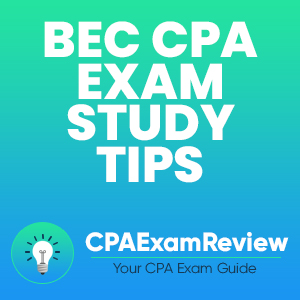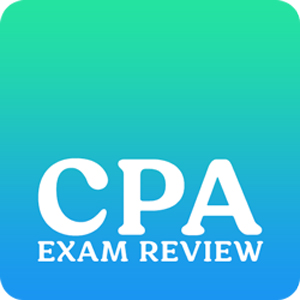 The Business Environment and Concepts (BEC) section of the CPA (Certified Public Accountant) exam is a unique component that tests a candidate’s knowledge in a blend of business, economic principles, and analytical skills.
The Business Environment and Concepts (BEC) section of the CPA (Certified Public Accountant) exam is a unique component that tests a candidate’s knowledge in a blend of business, economic principles, and analytical skills.
Unlike other sections of the CPA exam, BEC requires candidates to demonstrate not only their technical proficiency but also their ability to communicate complex business concepts effectively.
Here are essential study tips to help you navigate the intricacies of the BEC section.
9 Incredibly Useful Study Tips for the BEC Section of the CPA Exam
Contents
- 9 Incredibly Useful Study Tips for the BEC Section of the CPA Exam
- #1 Understand BEC Topics
- #2 Developing a Targeted Study Plan
- #3 Emphasizing Written Communication Skills
- #4 Focusing on Conceptual Understanding
- #5 Utilizing Diverse Study Materials
- #6 Practice with Multiple-Choice Questions and Simulations
- #7 Time Management During Preparation and Exam
- #8 Regular Review and Self-Assessment
- #9 Maintaining Motivation and Managing Stress
- Bottom Line
- Frequently Asked Questions
Here are 7 of the most useful BEC CPA Exam study tips:
#1 Understand BEC Topics
BEC encompasses a diverse range of topics that are crucial in the business world. It covers Corporate Governance, Economic Concepts, Financial Management, Information Systems, and Operations Management.
Understanding the scope of these areas is the first step in your preparation. This section assesses your ability to apply business knowledge in practical scenarios, making it essential to grasp both the theoretical and practical aspects of these topics.
#2 Developing a Targeted Study Plan
Given the broad nature of BEC, a targeted study plan is vital. Assess your strengths and weaknesses in the various topics and allocate your study time accordingly.
While some areas might require more attention, ensure you have a comprehensive understanding of all the topics. Your study plan should also be flexible, allowing you to adapt as you gauge your proficiency in different areas.
#3 Emphasizing Written Communication Skills
A unique aspect of BEC is the written communication tasks. These tasks require you to articulate business concepts clearly and concisely. Enhance your writing skills by practicing essay writing and focusing on clear, effective communication.
Pay attention to the structure, clarity, and relevance of your responses. Practicing under timed conditions can also help you manage the pressure of the exam setting.
#4 Focusing on Conceptual Understanding
For BEC, rote memorization of facts is less effective than a deep, conceptual understanding of the material. Focus on understanding the ‘why’ behind business procedures and economic principles.
Use real-world examples to see how theoretical concepts apply in practical business scenarios. This deeper understanding will not only aid in the multiple-choice questions but also in your written communication responses.
#5 Utilizing Diverse Study Materials
The wide range of topics in BEC calls for a diverse set of study materials. Utilize review courses, textbooks, and online resources that offer comprehensive coverage of BEC topics.
Interactive study tools, such as flashcards and mobile apps, can also be helpful for on-the-go review. Ensure that your study materials are current and align with the latest CPA exam standards.
#6 Practice with Multiple-Choice Questions and Simulations
Regular practice with multiple-choice questions (MCQs) and task-based simulations is crucial. These practices help you familiarize yourself with the exam format and types of questions you will encounter.
They also aid in reinforcing your knowledge and identifying areas that need more focus. Incorporate practice sessions consistently into your study routine.
#7 Time Management During Preparation and Exam
Effective time management is key, both during your preparation and on the exam day. During your study sessions, set specific goals for each session and take regular, short breaks to maintain focus.
In the exam, manage your time efficiently to ensure you can adequately address all sections, especially the time-consuming written communication tasks.
#8 Regular Review and Self-Assessment
Consistent review and self-assessment are essential components of an effective study strategy. Regularly revisit previously studied topics to reinforce your learning.
Use practice exams and quizzes to evaluate your understanding and adjust your study plan as necessary. This ongoing review process helps solidify your knowledge and boosts confidence.
#9 Maintaining Motivation and Managing Stress
Staying motivated and managing stress are crucial for effective studying. Set small, achievable goals to keep yourself motivated throughout your preparation.
Maintain a healthy lifestyle, with regular exercise and balanced nutrition, to manage stress levels. Remember to take breaks and engage in activities that help you relax and recharge.
Bottom Line
Preparing for the BEC section of the CPA exam can be a daunting task, but with the right approach and tools, it is entirely manageable.
The skills and knowledge gained in preparing for BEC are not just crucial for passing the CPA exam but also invaluable in your future career in accounting and business.
Stay focused, stay determined, and success in the BEC section will be well within your reach.
Frequently Asked Questions
What is the best way to study for the BEC section of the CPA exam?
The most effective approach is to combine thorough review of study materials with consistent practice using multiple-choice questions and task-based simulations. Additionally, practicing written communication tasks is crucial, as they are a unique component of the BEC section.
How much time should I allocate for studying each topic in the BEC CPA exam?
Allocate your study time based on your familiarity with each topic, with more time devoted to weaker areas. Topics like corporate governance, economic concepts, and financial management typically require more in-depth study.
Are there any specific strategies for tackling written communication tasks in the BEC exam?
Practice structuring your responses clearly and concisely, focusing on proper grammar and business writing style. Understanding the key concepts of the question and staying on topic is essential for these tasks.
How can I improve my time management skills for the BEC CPA exam?
Practice full-length exam simulations to get a feel for the pacing and develop a strategy for allocating time across multiple-choice questions, simulations, and written tasks. Time management is key to ensuring all sections are completed within the four-hour exam duration.

